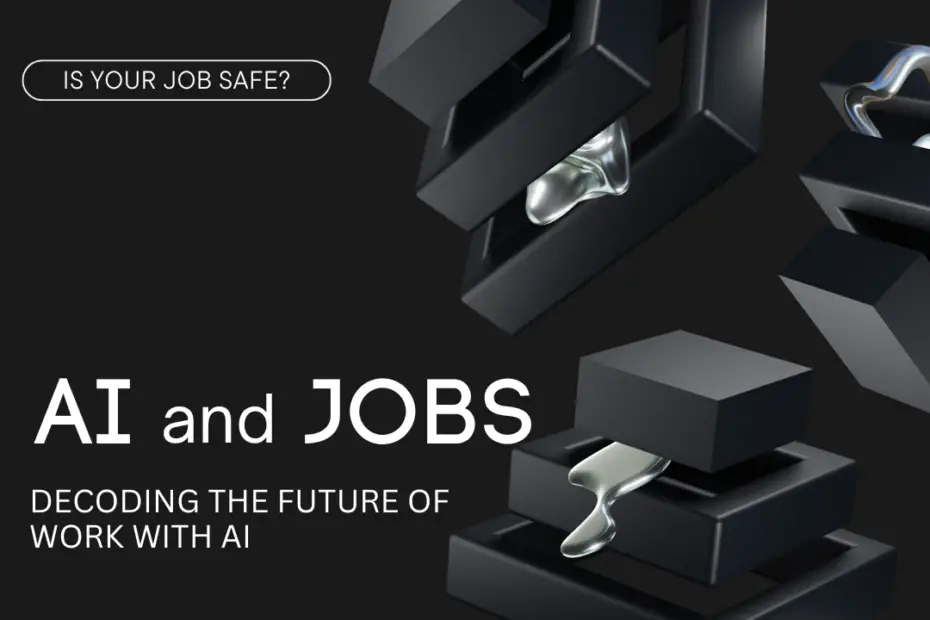Artificial intelligence (AI) is rapidly transforming our world, and its impact is undoubtedly being felt in the workplace. With headlines swirling about robots taking over jobs, it’s natural to wonder: is your job safe?
The answer, like most things in the AI revolution, isn’t a simple yes or no. Here, we’ll decode the future of work with AI and explore how it will reshape the job landscape, not eliminate it entirely.
AI: Partner, Not Replacement
AI excels at tasks involving data analysis, pattern recognition, and repetitive processes. This means some jobs with a high degree of automation could be significantly impacted. However, AI isn’t here to steal your job; it’s here to augment it.
Imagine AI handling the mundane administrative tasks that bog you down, freeing you to focus on higher-level strategic thinking, creativity, and problem-solving. AI can become a powerful partner, boosting your productivity and allowing you to make a greater impact.
The Rise of Human-AI Collaboration
The future of work will be defined by human-AI collaboration. Here’s why:
- Human ingenuity remains irreplaceable: AI can’t replicate human creativity, empathy, and critical thinking skills. These uniquely human strengths will be essential for innovation and leadership in the AI-powered workplace.
- AI thrives with human guidance: AI algorithms require human input to be effective. Humans will play a crucial role in setting goals, interpreting results, and ensuring AI is used ethically and responsibly.
Future-Proofing Your Career
The key to thriving in the AI era is adaptability. Here are some ways to future-proof your career:
- Embrace lifelong learning: Develop new skills that complement AI, such as data analysis, digital marketing, or complex problem-solving.
- Focus on soft skills: Communication, collaboration, and critical thinking will be even more valuable as human-AI teams become the norm.
- Become an AI expert: Understanding AI’s capabilities and limitations will empower you to leverage its potential and navigate the changing work environment.
Conclusion: The Future of Work is Bright
AI is a powerful tool with the potential to revolutionize the workplace for the better. While some jobs may transform, new opportunities will emerge. By embracing lifelong learning and developing the skills that complement AI, you can not only ensure your job security but also thrive in the exciting future of work.
SEO Optimization Tips:
- Include relevant keywords throughout the blog post, like “AI in the workplace,” “future of work,” and “human-AI collaboration.”
- Optimize your meta description with a concise and compelling summary of the blog post.
- Use header tags (H2, H3) to break up the text and improve readability.
- Promote your blog post on social media platforms like LinkedIn and Twitter.
AI and the Transformation of Job Roles: A Look at Different Industries
While AI won’t eliminate jobs entirely, it will undoubtedly transform them. Let’s explore how AI might impact specific industries:
Manufacturing: AI-powered robots will likely handle repetitive tasks on assembly lines, while human workers oversee operations and focus on quality control and maintenance.
Customer Service: Chatbots powered by AI will handle routine customer inquiries, freeing up human agents for complex issues requiring empathy and problem-solving.
Healthcare: AI can analyze medical data to assist with diagnosis and treatment planning. However, human doctors will remain crucial for patient care, decision-making, and emotional support.
Transportation: Self-driving vehicles are on the horizon, impacting jobs in the transportation sector. However, human oversight and maintenance will still be required, along with new roles in managing autonomous vehicle fleets.
Education: AI tutors can personalize learning experiences, but human teachers will continue to be vital for fostering creativity, critical thinking, and social interaction in students.
Creative Industries: AI can automate tasks like content creation or music generation. However, human creativity will remain irreplaceable in developing original ideas and adding the human touch.
This is not an exhaustive list, but it highlights how AI will reshape job roles across various industries. The key takeaway is that AI will complement and augment human skills, making jobs more efficient and effective.
Emerging Opportunities in the AI Era
The rise of AI also opens doors to exciting new career paths:
- AI ethicists: Ensuring responsible development and use of AI.
- Data scientists: Extracting insights from vast datasets to inform AI development.
- AI programmers: Designing and building AI algorithms and applications.
- AI trainers: Training AI models on specific tasks and datasets.
- Human-AI interaction specialists: Designing interfaces and processes for seamless human-AI collaboration.
By focusing on these emerging fields, you can position yourself for success in the AI-powered future of work.
Remember, the future of work is not a competition between humans and machines. It’s about collaboration and leveraging the unique strengths of both to create a more productive and innovative work environment. So, embrace the change, equip yourself with the right skills, and get ready to thrive in the exciting world of work alongside AI.
